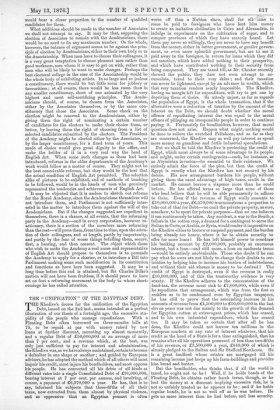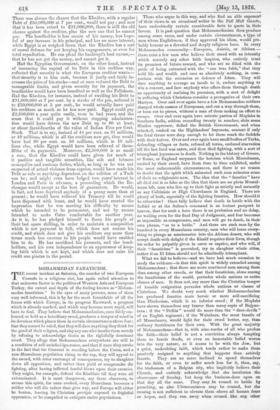THE " UNIFICATION " OF THE EGYPTIAN DEBT.
THE Khedive's decree for the unification of the Egyptian Debt, issued on the 2nd inst., seems intended as a perfect illustration of our thesis of a fortnight ago, the excessive stu- pidity of the people who manage repudiations. With a Floating Debt often borrowed on three-months bills at 75, to be repaid at par with money raised by new loans at further discount, mounting up almost momently, and a regular Debt of £50,000,000 at an average of more than 7 per cent., and a revenue which, at the best, was only just sufficient to pay for interest and administration, the Khedive was, as we have always maintained, certain to become a defaulter in one shape or another ; and guided by European advisers, he has adopted the method which of all others will most impair his credit, most injure his bondholders, and most oppress his people. He has converted all his debts of all kinds at different rates into a single Consolidated Debt of £91,000,000, bearing interest at 7 per cent. per annum, and involving, of course, a payment of £6,370,000 a year. He has, that is to say, informed his subjects that three-fifths of all their taxes, now extracted from them almost by physical violence, and so oppressive that an Egyptian peasant is often worse off than a Nubian slave, shall for all mc to come be paid to foreigners who have lent him money to create an imitation civilisation in Cairo and Alexandria, to indulge in experiments on the cultivation of sugar, and to conquer provinces of which they have scarcely heard. Let them pay never so willingly, they are never to have any benefit from the money, either in better government, or gentler govern- ment, or even more splendid government, but are to see it paid away to the foreigner, in return for loans which they did not sanction, which have added nothing to their prosperity, and which have contributed nothing to their security from being conquered. They are taxed till, as Mr. Chester recently showed the public, they dare not even attempt to ac- cumulate, taxed to their very skins ; and their taxation can never be lightened, except by an advance in wealth, which that very taxation renders nearly impossible. The Khedive, having no margin left for expenditure, will try to get one by depriving them of theirs. So utterly unjust, as far as regards the population of Egypt, is the whole transaction, that if the alternative were a reduction of taxation by the amount of the interest on the Debt, we should doubt whether the moral offence of repudiating interest due was equal to the moral offence of pillaging an irresponsible people in order to continue paying it. Fortunately for bondholders, however, that moral question does not arise. Happen what might, nothing would be done to relieve the wretched Fellaheen, and as far as they are concerned, the Khedive may as well pay interest as spend more money on grandiose and futile industrial speculations.
But we shall be told the Khedive is protecting the credit of Egypt, which must always be of some advantage to its people, and might, under certain contingencies—such, for instance, as an Abyssinian invasion—be essential to their existence. We entirely admit the force of the plea, but then the credit of Egypt is exactly what the Khedive has not secured by his decree. His new arrangement burdens his people, without giving them the usual advantage of high taxes, credit in the market. He cannot borrow a sixpence more than he could before. He has offered terms so large that none of those who lend believe that he will be able permanently to adhere to them. Even if the revenue of Egypt really amounts to £10,000,000 a year, £6,370,000 is scrmonstrous a proportion to take out of that for Debt—we omit the private property, as sure, somehow, to be spent for private purposes—that no one believes it can continuously be taken. Any accident, a war to the South, a failure in the cotton crop, a demand for a contingent to serve the Sultan in Crete, or Arabia, or Syria, would render it imperative on the Khedive either to borrow or suspend payment, and the burden being already too heavy, where is he to obtain security to offer for more loans? He has left himself power to overdraw his banking account by £2,000,000, probably at enormous interest, but a loan—and still more, a loan on moderate terms —would be entirely unobtainable. Those who doubt if he can pay what he owes are not likely to change their doubts to cer- tainties by helping him to increase his burden of indebtedness, and without their aid whence is money to be derived ? The credit of Egypt is destroyed, even if the revenue is really £10,000,000, and of this the trustworthy evidence is very scanty. If the Khedive adheres to the commutation of the land-tax, the revenue must sink to £7,000,000, while even if he repudiates that arrangement, which was from the rust so reckless as to be condemned even by Egyptian taxpayers, he has still to prove that the astounding increase in his accounts of revenue from £4,500,000 to £10,000,000 in the last eleven years was not due mainly to the growth of the demand for Egyptian cotton at extravagant prices, which has ceased, and to his own industrial expenditure, which has ceased too. It may be taken as certain that after all he has done, the Khedive could not borrow ten millions in the European markets at any rate of interest whatever, that his credit as the head of a State is for a time extinguished, that he remains after all his operations possessed of less than two-fifths of his revenue, or £3,500,000 a year, £840,000 of which is already pledged to the Sultan and Sir Stafford Northcote. He is a great landlord whose estates are mortgaged till his remaining income just keeps up his farm-buildings-and provides him bread and butter.
But the bondholder, who thinks that, if all the world is taxed, he ought not to be I Well, if he holds bonds of the Floating Debt, he obtains rather harsh terms, though, as he lent the money at a discount implying excessive risk, he is not so unfairly treated as he appears to be ; and if he holds regular bonds, he is not so well off as he was before. He gets no more interest than he had before, and less security. There was always the chance that the Khedive, with a regular Debt of £50,000,000 at 7 per cent., would not pay ; and now that it has been raised to £91,000,000, there is still the-old chance against the creditor, plus the new one that he cannot pay. The bondholder is less secure of his money, less hope- ful of any increase in his principal, and has no more interest, while Egypt is so weighed down that the Khedive has a sort of moral defence for not keeping his engagements, or even for total repudiation. He can plead the bankrupt's best excuse,— that he has not got the money, and cannot get it.
Had the Egyptian Government, on the other hand, instead of increasing the capital of its Debt in this reckless way, reflected that security is what the European creditor wants— that security is to him cash, because it justly and fairly in- creases the price of his stocks—and at once reduced the Debt to manageable limits, and given security for its payment, the bondholder would have been benefited as well as the Pellaheen. Had the Khedive, for instance, instead of swelling his Debt to £91,000,000 at 7 per cent. by a stroke of the pen, reduced it to £50,000,000 at 5 per cent., he would actually have paid his creditors as much as he has now paid. Egypt could pay £2,500,000 a year quite easily, even in bad years, and the sense that it could pay it without stopping administra- tion would have driven the new Debt up to 80 at least, or about three-fourths of the value of Indian Five per Cent. Stock That is to say, instead of 44 per cent. on 91 millions, or 40 millions, which is all the creditors now get, they would have had 80 per cent. on 50 millions, which is 40 mil- lions also while Egypt would have been relieved of three- fifths of its payments. Moreover, £2,500,000 is so small a sum, that the Khedive could have given for much of it positive and tangible securities, like salt and tobacco monopolies and customs duties, which, so long as he was not suspected of actual violence from caprice would have made his Debt as safe as anything dependent on the volition of a Turk can be ; and might even have lodged two years' interest in London and Paris in advance, a proceeding which the Ex- changes would accept as the best of guarantees. He would, in fact, not have deprived anybody of a penny more than at present ; he would have relieved his Treasury till he could have dispensed with loans, and he would have created the impression that he was meeting his difficulty by means which he intended to be permanent, and not by means intended to make Cairo comfortable for another year. As it is, he has pledged himself to fleece his people of their last spare shilling, in order to maintain a composition which is not payment in full, which does not restore his credit, and which does not give his creditors any more than terms ranch less onerous to his people would have enabled him to do. He has sacrificed his peasants, and the bond- holders' and his own independence to an appearance of keep- ing faith which is not kept, and which does not raise his credit one piastre in the pound.



































 Previous page
Previous page